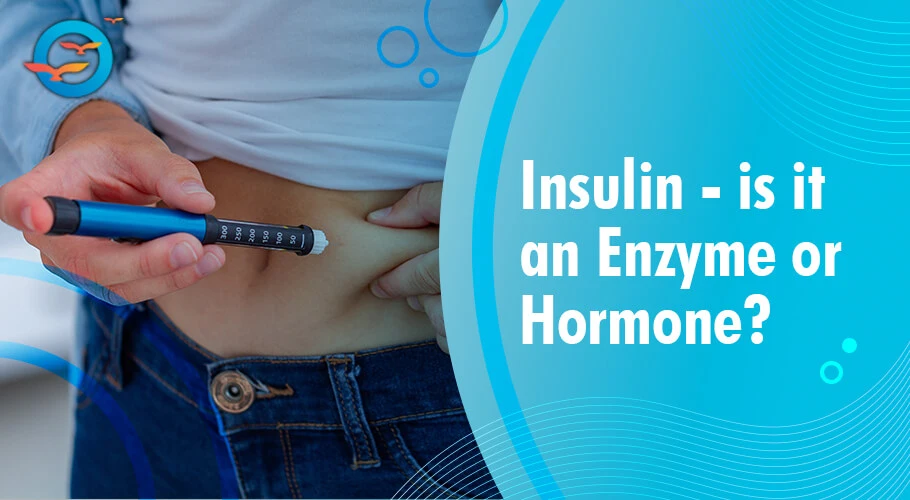Insulin: Is it an enzyme or hormone?

Insulin Hormone vs. Enzyme
While both hormones and enzymes are chemicals that enable biological functions, there is one major difference between the two. Enzymes catalyze reactions and hormones behave like messengers, triggering different body functions. This makes insulin a hormone rather than an enzyme. In fact, it is considered the body’s main anabolic hormone. Insulin promotes the absorption of glucose from the blood into the liver, fat cells, and muscle cells.
Here, the absorbed glucose is converted into either glycogen, through a process known as glycogenesis, or into fat (triglycerides), via lipogenesis or, both, which happens in the liver. Now, if there is a high concentration of insulin in the blood, glucose production and secretion by the liver are compromised.
High insulin in the blood also impacts the synthesis of protein in a wide variety of tissues. This is why it is considered an anabolic hormone. On the other hand, low insulin levels have the opposite effect. They trigger the widespread breakdown of tissue—especially stored body fat, in other words: catabolism.
Insulin is produced by the beta cells in the islets of Langerhans, which are situated in the pancreas. These beta cells are sensitive to blood glucose levels, i.e. they release insulin into the blood if blood glucose level is high, and prevent the secretion of insulin when the blood sugar level is low.
Insulin has three basic functions:
- To control the volume of glucose in the bloodstream at any point in time
- To enable storage of glucose in the liver, fat, and muscles
- To regulate the metabolism of macronutrients (i.e. carbohydrates, fats, and proteins)
Without insulin, the body would be unable to store glucose in the muscles or liver, and neither could it produce fat. The absence of glucose would cause fat to break down, in the process producing keto acids, which can trigger a potentially fatal condition known as diabetic ketoacidosis, if fatty acid levels grow too high.
How insulin regulates blood sugar
When one consumes any food, a portion of the food is converted into glucose, which enters the bloodstream, causing glucose levels to rise. When this happens, typically, the pancreas secretes insulin, enabling muscle cells to open and permitting glucose to enter. When this function fails—as happens in the event of unmanaged diabetes—glucose continues to accumulate in the blood, leading to high blood sugar levels (BSL). If this situation continues for a prolonged period, it will lead to diabetes.
Insulin signals a fed or fasted state in the body. When insulin level is high, it sends out a ‘fed’ signal, which tells the body to begin storage of fuel. On the other end of the scale, low insulin levels, indicate a ‘fasting’ state. This triggers the mobilization of stored fuel (i.e. glycogen).
In the 1920s insulin was discovered and it led to intensive research to understand insulin action and resistance. Today, we know that insulin is present not only in human beings but all animals. The presence of insulin or insulin-like peptides creates an anabolic response to nutrient availability.
With the massive spread of diabetes in world populations, insulin has become a critical medication. In fact, the WHO has placed Insulin on its Model List of Essential Medicines. This is a list of the most needed medications in a basic health system.
Insulin ranges
Insulin levels in the blood are measured in international units (IU) and are taken at different times o the day, mainly early in the morning before one consumes any food. This is also known as Fasting Sugar. Blood sugar levels are measured again immediately following a meal, i.e. the Post Prandial (PP) reading. Readings taken at other times are classified as random readings. In general, random readings should not exceed a count of 140 in normal adults and should be less than 100 when taken on an empty stomach.
Insulin can be both too high and too low. Both are detrimental to body functions. Hypoinsulinemia, i.e. low insulin level, causes insulin-deficient diabetes, whilst a permanently elevated level of insulin, hyperinsulinemia, disrupts normal cellular physiology and organ function.
Hyperinsulinemia also increases the risk of obesity, type 2 diabetes, cardiovascular disease, and reduced life expectancy.
In a nutshell
Insulin is essential to maintain glucose balance. Which it does by facilitating the uptake of glucose into muscle and fat cells post meals.
If there is a deficiency in dietary glucose supply—as during sustained fasting—the body uses glucose from its liver stores, through a process known as gluconeogenesis. If insulin levels in the body are below the needed concentration for glucose uptake from the blood, the body’s stores of fat and protein are used for energy production.
Maintaining a steady balance of insulin in the body is necessary to avoid insulin resistance, which is the root cause of a host of lifestyle disorders, including Type 2 Diabetes (T2D), hypertension, heart disorders, kidney disease, and more. A balanced diet, complemented by proper exercise and stress release can help avoid insulin resistance.
Here, at Freedom from Diabetes, we advocate a four-pronged approach to stopping and reversing insulin resistance. Through our four protocols of diet-exercise-stress release-medical supervision, we have been able to help tens of thousands get free of their medicines and go on to live healthy, happy, and more fulfilling lives.
For more information on how you can avoid the dangers of insulin resistance, or if you’re already suffering from diabetes or any other insulin-resistance-related disorder, visit our programs page at www.freedomfromdiabetes.org/program or subscribe to our Facebook, Instagram, and YouTube channels to stay informed and safe.
FAQs
What is insulin, an enzyme or a hormone?
Insulin is a hormone, not an enzyme.
What does insulin do in the body?
Insulin helps regulate blood sugar levels by allowing cells to absorb glucose.
How does insulin control blood sugar?
Insulin signals cells to take in glucose from the blood, lowering blood sugar levels.
Why is insulin important for diabetes management?
Insulin helps keep blood sugar levels in check, which is crucial for people with diabetes.
Can the body produce its own insulin?
Yes, insulin is naturally produced by the pancreas in healthy individuals.

